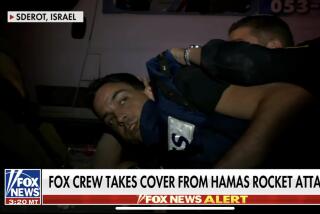TV AND THE GULF WAR : Captioners’ Frantic Efforts Help the Hearing-Impaired
- Share via
The words of war are getting a wider television audience than usual.
That’s because an estimated 1.2 million deaf or hearing-impaired viewers in the United States are receiving special attention from ABC, CBS and NBC during the Persian Gulf hostilities. This is the lucky group--a tiny minority of the nation’s estimated 24 million persons with hearing disabilities--who have TV sets with costly special decoders that provide closed-captioning of TV programs.
CNN, the indispensable 24-hour mainstay of the Gulf coverage, has no captioning, unfortunately. The network cites the “prohibitive” cost involved, but vows to explore doing it “on a limited scale.”
But more than two-thirds of the programs on ABC, CBS and NBC, and nearly all of their regularly scheduled newscasts, have closed captions--tiny subtitles contained in a portion of the TV signal that appear on the screen only when activated by a special decoding device that can be purchased commercially.
It’s the unscheduled news programming--the resonating bulletins and special reports that keep viewers in touch with fast-breaking Gulf developments--that normally would be beyond the realm even of the relatively small group of hearing-impaired viewers who have access to decoders.
But during the Gulf War, the nation’s major closed-captioners have been funded to extend their activities to unscheduled programming, and they’ve responded, turning Operation Desert Storm into Operation Closed-Captioning Storm.
They were never busier than early in the war, going on a 42 1/2-hour captioning binge when network news operations went continuously live to cover the initial stages of the conflict. And since then, they have continued to close-caption virtually all unscheduled news.
The captioning is simultaneous, giving the deaf and hearing-impaired access to TV’s frequently knee-jerk instantaneous coverage. That may not be a blessing, but at least it’s equal opportunity.
“It’s very exciting,” said Deborah Popkin Schuster, executive director of program marketing for the National Captioning Institute, the oldest and largest of the captioning outfits. “The staff working on this recognizes they are in the middle of the biggest news story and they are affecting the lives of all of our viewers who rely on closed-captioning to know what’s going on in the world.”
Although NCI provides captions for most CBS and NBC prime-time programs and all of ABC’s, the only news programming it does is ABC’s. NBC News and “The MacNeil/Lehrer NewsHour” on PBS are done by the Caption Center in Boston, and CBS News is done by both the Caption Center and CaptionAmerica in Pittsburgh.
Although the audience they now reach is relatively small, that will change in 1993, when federal law requires new sets with 13-inch screens or larger to be equipped with decoders.
In its Falls Church, Va., captioning center, meanwhile, NCI monitors ABC 21 hours a day--from 4 a.m. to 1 a.m.--but is available to work around the clock if alerted by the network. “As soon as ABC is on the air, we’re on the air,” the Los Angeles-based Schuster said.
“Real-time” captioners (most of them are former court reporters) simultaneously watch a monitor and type on a shorthand machine connected to a computer, which translates the phonetic impulses into words. The data is transmitted over a modem to the network.
Given the pressurized war environment, the work is especially stressful, and captioners assigned to extended war coverage are constantly rotated to keep them fresh. “In an extended format (such as continuous war coverage), the most anyone can go is 10 or 15 minutes at a time,” said David Orphan, NCI director of live captioning services in Falls Church.
More stress may be coming for the captioners, for despite eleventh-hour diplomacy, the possibility of a massive land war looms. “We were just working on our weekend rosters to see who would be here if hostilities break out,” Orphan said. “We’ve alerted people to the possibility that it might heat up and to expect a phone call.”
Schuster says that since the start of Gulf hostilities, NCI has received record amounts of mail from viewers with hearing disabilities “thanking us for making them feel a part of this country.” And part of this war.
More to Read
The biggest entertainment stories
Get our big stories about Hollywood, film, television, music, arts, culture and more right in your inbox as soon as they publish.
You may occasionally receive promotional content from the Los Angeles Times.










